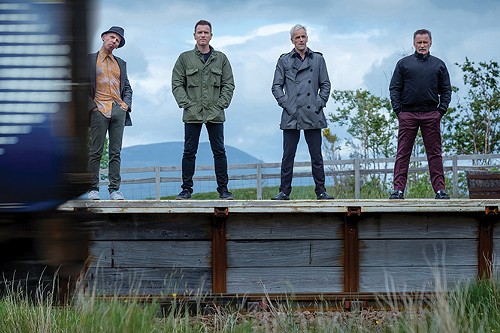Brexit-stential Blues
T2 revisits Trainspotting 20 years later, in a more complicated world.
By MaryAnn Johanson"Choose life," Mark Renton suggested back in Danny Boyle's original 1996 Trainspotting. The Edinburgh heroin addict's advice was ironic, of course—he was courting death. But he was also rebelling against a life of conformity and consumerism. Trainspotting hardly romanticized drug addiction—the film's depiction of the ravages of smack are mostly disgusting (sometimes hilariously so) and often horrifying—but there was a certain defiance, a certain choosing to live on one's own terms, in Mark's refusal to sleepwalk into doing the expected. That came to the fore in the film's ending, when he walked away from his friends with the gym bag full of money they'd all just scammed their way into. Nasty, perhaps. Uncool to his friends, definitely. But what a choice.
Turns out, being a heroin addict/thief was going to be the high point of Mark's life. You thought the 1990s were awful? Welcome to the 2010s. Whatever sparse, cold satisfaction might have been wrung from Trainspotting's punk insolence is gone from T2, replaced with an exhausted, bitter cynicism that barely has any tolerance for melancholy and even less room for sympathy.
It's today in T2, and Mark (Ewan McGregor), fleeing a failed marriage, returns from an extended sojourn in Amsterdam to discover that Simon (Jonny Lee Miller)—aka Sick Boy—is landlord of a rundown pub; Begbie (Robert Carlyle) is in prison; and Spud (Ewen Bremner) is still a junkie. None of them are very happy to see Mark, and indeed his motive in turning up seems to be more akin to a pendulum swinging inevitably back to its starting point than any genuine desire to see his old friends.
What happens from there includes more felonies, a bit of drug use (though not much; Mark is mostly addicted to exercise these days) and some traditional male bonding (or re-bonding, in this case). It's inevitably less shocking than Trainspotting was, partly because its characters are older, a tad wiser and too worn-out by living on the edge to do that anymore.
We're no longer surprised by Boyle's genius; Trainspotting was only his second feature, and we now know what to expect from him. Of course, he is a master, and T2 is visually stirring and exciting. One particularly heart-wrenching image lets a shadow on a wall emphasize the hole that the death of Mark's mother left on his little family and childhood home.
But the most intriguing aspects of T2 are thematic, in the passage of time not only for these characters but for the world. The film was shot last summer, after the Brexit vote and after Donald Trump had secured the Republican presidental nomination, and it can't help but score zingers on the same forces of cultural retreat and retrenchment that have driven these connected realities. (T2 is very British, but it will resonate with Americans, too.)
Mark arrives back in Edinburgh to find a very different city from 1996, all Starbucks and pretty, young Eastern European things handing out brochures in tiny tartan skirts. He's amused by this—Amsterdam had been much the same—and later he gets involved in a scam with Simon to get some EU development money for a rather shady improvement to his pub. There's a Euro cheeriness to T2, and a definite smack at those who cling to ancient, local identities, like the members of a social club who can't let go of a military victory that happened in 1690, and whom Mark and Simon are able to rip-off because they are so predictable in their singlemindedness.
Mark's got a new "choose life" speech here, and it's all about the brutality of social media and the crushing horribleness of the economy. But there's nothing nostalgic, no yearning for the past, and when it seems as if Mark is about to descend into sentimentality over his return home, Simon warns him to snap out of it: "You're a tourist in your own youth," Simon moans in such a way as to suggest that this is not a good idea.
There might be a lot of rage against the reality of Brexit and Trump, but there's no suggestion of going backward—only forward and through.
More by MaryAnn Johanson
-
Feature movie review: Society of the Snow
A new adaptation finds new power in a 50-year-old event.
- Jan 3, 2024
-
Film Reviews: New Releases for Dec. 8
The Boy and the Heron, Maestro, Eileen, Leave the World Behind
- Dec 7, 2023
-
Feature movie review: MAESTRO
Bradley Cooper's Leonard Bernstein biopic avoids cliché and offers electrifying audacity
- Dec 6, 2023
- More »
Latest in Film Reviews
Readers also liked…
-
Power Plays
Two satirical comedies explore manipulations and self-delusions by those with power.
- Aug 31, 2022



